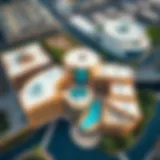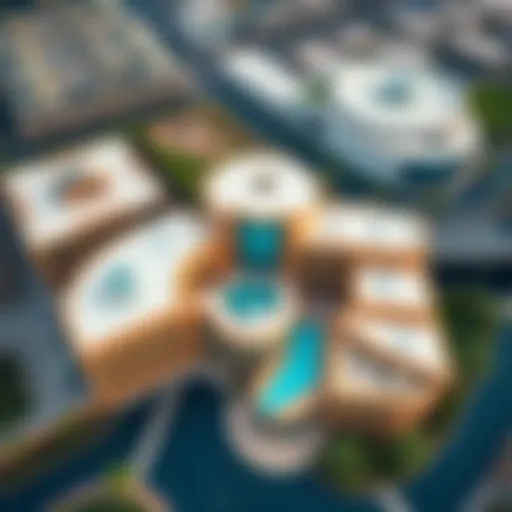Living Standards in Dubai: A Comprehensive Overview
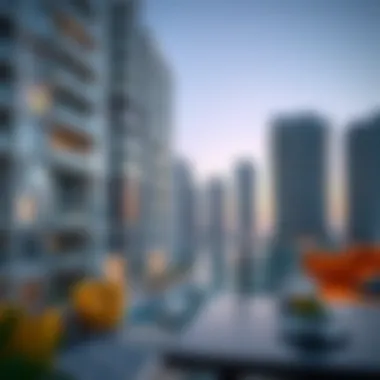

Intro
Dubai, a city synonymous with luxury and ambition, has transformed itself into a global hub offering residents a unique blend of modernity and tradition. Living standards here reflect a fascinating tapestry woven from diverse cultures, innovative infrastructures, and robust economy. This article seeks to explore various dimensions that shape the living experience in Dubai, shedding light on essential elements such as property markets, housing options, and community features.
Market Trends
Current Property Prices
As Dubai continues to attract investors and expatriates alike, the dynamic property market plays a pivotal role in its living standards. The current property prices vary significantly depending on the location and type of accommodation. For example, areas like Downtown Dubai and Dubai Marina command higher prices due to their proximity to entertainment hubs and breathtaking views. In contrast, neighborhoods such as Jumeirah Village Circle tend to offer more affordable housing without sacrificing quality.
Interestingly, the market has seen a shift towards more manageable prices for rentals and purchases in response to changing demographics and economic factors. According to recent data, the average rent for a two-bedroom apartment in Dubai has hovered around AED 85,000 per year, a figure that reflects both the luxurious lifestyle on offer and the competitive nature of the market.
Future Market Projections
Looking ahead, experts predict a steady increase in property values, bolstered by upcoming infrastructural projects and the city’s strategic initiatives. The UAE's Vision 2021 aims to enhance the living environment, making it even more appealing for potential investors and residents. The introduction of new developments, such as the Dubai Harbour and Dubai Creek Tower, signals growing interest and investment in the residential sector.
"Dubai’s property market has the potential for impressive growth, driven by high demand and a favorable regulatory environment."
In fact, many analysts believe that with the anticipated influx of global expatriates, the rental demand will consequently rise, translating into a positive trajectory for both property prices and rental rates.
Lifestyle Insights
Neighborhood Highlights
The neighborhoods spread across Dubai are as varied as its populace. Each area presents distinct characteristics and appeals. For instance, the vibrant atmosphere of Jumeirah Beach residences attracts families, while the cultural richness of Al Fahidi Historic District offers a glimpse into the heritage of the Emirate.
Some standout neighborhoods include:
- Dubai Marina: Known for its high-rise apartments with stunning waterfront views and a lively dining scene.
- Downtown Dubai: Home to the iconic Burj Khalifa and an array of luxury shops and restaurants.
- Al Barsha: A family-friendly area with a balance of local amenities and parks, making it suitable for expatriates.
Community Amenities
In Dubai, community amenities play a crucial role in shaping quality of life. From parks and recreational facilities to shopping centers and cultural institutions, residents often find that convenience is a hallmark of living here. Facilities that cater to fitness, family entertainment, and social activities are integrated into many neighborhoods. This diversity in amenities enhances the living experience, creating spaces for community engagement.
- Parks and Recreation: Facilities such as Al Quoz Park and Safa Park offer much-needed respite amidst the bustling lifestyle.
- Shopping Hubs: Malls, like The Dubai Mall and Mall of the Emirates, are well-equipped, providing everything from luxury brands to everyday needs.
- Educational Institutions: The presence of schools with international curricula adds to the appeal for families seeking stability and quality education.
In summary, understanding living standards in Dubai requires a nuanced examination of its property landscape and community lifestyle. As this vibrant city evolves, it continues to uphold a blend of tradition and modernity, attracting a diverse array of residents looking to call this exceptional place home.
Overview of Dubai's Living Standards
In a world that's rapidly changing, Dubai stands out as a beacon of progress, luxury, and modern living. Understanding the living standards in Dubai is not just crucial for potential residents but also invaluable for investors looking to tap into its booming real estate market. This dynamic city offers a unique tapestry of lifestyles shaped by its rich cultural diversity and ambitious development plans.
What makes Dubai’s living standards so remarkable is the blend of traditional and ultra-modern elements. From opulent skyscrapers like the Burj Khalifa to sprawling malls, every aspect is designed to cater to a high quality of life. However, the city is not merely about luxury; it also provides a variety of housing options that can accommodate different budgets. By grasping the factors influencing living standards here, investors, realtors, renters, and developers can make more informed decisions.
The Evolution of Living Standards
Dubai has come a long way from its humble beginnings as a fishing village. The discovery of oil was a turning point that spurred an economic boom in the 20th century. As wealth poured into the emirate, infrastructure began to develop at an unprecedented pace. The government invested heavily in public services, housing, and healthcare, leading to a significant enhancement in living conditions. In the past few decades, the timeline from the 1980s onwards shows a marked shift towards luxury and excess, with lavish properties and a global attraction for expatriates.
As time ticked by, Dubai's ambitions grew. Today, the city is working toward becoming a global hub for innovation and technology, which impacts living standards. The advent of free zones and tax benefits attract new businesses, making Dubai even more appealing for residents and investors alike. Understanding this evolution helps contextualize current living conditions and sets the stage for exploring future forecasts.
Current Trends in Residential Living
In recent years, the residential landscape of Dubai has seen a shift toward sustainable and community-oriented living. Developers are now focusing on creating not just homes, but entire neighborhoods where people can live, work, and play in harmony. The rise of ‘smart homes’ integrates modern technology with daily living, reflecting the aspirations of a tech-savvy population. Additionally, Dubai is increasingly becoming pet-friendly, with more parks and pet-friendly amenities popping up in various communities.
While luxury living remains a significant draw—showcased in areas like Marina and Downtown—affordable housing options are gaining attention. The government has initiated projects aimed at providing more accessible housing, particularly for middle-income families. This diversification in housing options appeals to a wider range of residents, making Dubai a more inclusive place to live.
"Understanding the nuances of living standards in Dubai reflects the city’s ongoing transformation and adaptation to global trends."
These evolving dynamics make it essential for anyone—be it an investor, renter, or developer—to stay updated with local trends and how they impact the living experience in Dubai. With constantly shifting demands, Dubai’s residential scene is one to watch.
Housing Options in Dubai
Housing in Dubai plays a pivotal role in determining the quality of life for residents. With a remarkable blend of luxury and affordability, Dubai’s housing scene caters to a diverse range of individuals, from expatriates to long-term residents and investors. Understanding these options is crucial for anyone contemplating a move to the city or looking to invest in real estate. The choices in housing not only reflect the cosmopolitan nature of Dubai but also highlight the ongoing transformation of the city into a global hub.
Luxury Apartments vs. Affordable Housing
When talking about luxury apartments in Dubai, one conjures images of sky-high towers overlooking the azure waters of the Gulf. These residences offer not just a place to live, but a lifestyle defined by opulence. Amenities often include concierge services, state-of-the-art gyms, spas, and direct beach access. Neighborhoods like Dubai Marina and Downtown Dubai are prime examples where one might find these high-end living arrangements. Rent in these areas can reach astronomical heights, making them suitable primarily for affluent expats or high-net-worth individuals.
On the other hand, affordable housing in Dubai is far from shabby. Several developments provide quality living spaces that are budget-friendly. Areas like Al Quoz or Dubai Sports City showcase a mix of modern apartments and villas appealing to families and young professionals. The rental prices in these areas are noticeably lower while still offering decent amenities, a real win-win for those looking to balance quality and cost.
It's also essential to consider the long-term outlook. While luxury apartments may seem attractive, they often come with hefty maintenance fees. Affordable housing can provide sustainable options for families or individuals looking to live comfortably without breaking the bank.
- Pros of Luxury Apartments:
- Cons of Luxury Apartments:
- Pros of Affordable Housing:
- Cons of Affordable Housing:
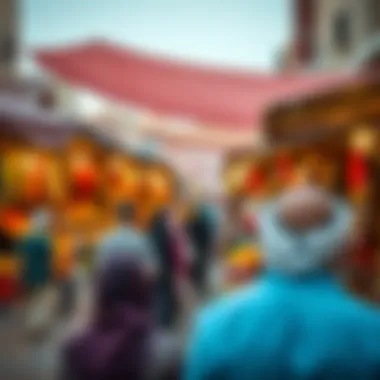

- Exceptional views and designs
- Top-notch facilities
- Prime locations
- High rental costs
- Additional maintenance fees
- Lower rental costs
- Community-centered
- Access to necessary amenities
- Limited luxury amenities
- Possible distance from business hubs
In summary, whether you’re drawn to the luxurious lifestyle or looking for a more economical place to settle down, the diversity of housing options in Dubai has something for everyone. Evaluating personal priorities—be it aesthetics, budget, or location—will ultimately guide prospective residents in their housing decisions.
Popular Neighborhoods for Different Budgets
Navigating the neighborhoods in Dubai can be a bit like shopping at a bustling market; various options catch your eye, each with its vibe and advantages. For those with deeper pockets, the bustling heart of the city offers quarters like Downtown Dubai and Jumeirah Beach Residence (JBR), where lifestyle and leisure meld seamlessly. Both areas boast proximity to fine dining, shopping malls, and cultural landmarks, making them a coveted choice among the wealthy.
For those working with a tighter purse string, districts such as Deira and Bur Dubai present a rich mix of culture and convenience. These older parts of the city offer authentic experiences, bustling markets, and a more traditional way of life, accompanied by rental prices that won't send one into a financial tailspin.
Other noteworthy neighborhoods include Dubai Silicon Oasis, which attracts young professionals and families seeking affordable housing with modern amenities, while Dubai Investment Park offers a blend of residential and commercial spaces. Each neighborhood has its unique character, contributing to the overall mosaic of Dubai’s living experience.
Note: When selecting a neighborhood, consider factors such as proximity to work, schools, and leisure activities.
This strategic approach to housing choices ensures a comfortable life in Dubai for every type of resident.
Cost of Living Analysis
The cost of living in Dubai is a multifaceted issue that greatly influences both the daily lives of residents and the decisions of potential investors. Understanding this aspect is crucial, particularly for those looking to move to the city or invest in real estate. The cost of living encompasses a variety of elements, including housing expenses, utility bills, and the overall pricing of goods and services. By breaking down these components, we can appreciate the economic landscape that defines life in a city like Dubai.
Housing Costs
Housing costs can be a significant burden on both newcomers and long-term residents. According to latest reports, rent in Dubai fluctuates widely based on location and type of accommodation. Luxurious apartments in areas like Downtown Dubai or the Palm Jumeirah can command prices upwards of AED 150,000 annually, while more affordably priced options in neighborhoods like Al Quoz or Discovery Gardens might be closer to AED 50,000.
- Factors Influencing Housing Prices -:
- Location: The proximity to amenities, schools, and transport links impacts pricing.
- Market Demand: Popular areas see increased rental prices due to higher demand.
- Type of Property: Villas, apartments, and townhouses come at different price points.
It’s vital for potential tenants or buyers to explore various districts, and even negotiate terms when possible. Also, being aware of the seasonality of the rental market can open doors to better deals.
Utilities and Everyday Expenses
Utilities in Dubai can also add up quickly. Here’s a snapshot of what you can expect:
- Electricity and Water Bills: These often come as a shock, especially with the scorching summers leading to higher air conditioning usage. A typical household might expect to pay between AED 600 to AED 1,200 monthly.
- Internet Costs: Internet packages vary, but an average monthly bill is around AED 400.
- Groceries: Supermarket prices can vary; a simple weekly grocery shop can cost anywhere from AED 300 to AED 600 depending on dietary choices. One can avoid costly imported goods by shopping at local markets.
It’s essential to budget wisely for these everyday expenses, as they can take a good chunk out of a monthly income, impacting savings and discretionary spending.
Comparison with Other Major Cities
When compared to other major global cities, Dubai presents a mixed bag. In terms of housing costs, the city can be on par with metropolises like London and New York, particularly in high-demand areas. However, it tends to be more affordable when you look at utility expenses and food costs.
- Housing Costs Comparison:
- Utilities: While Dubai residents pay a premium, cities like Paris often have higher electricity costs due to varying regulations.
- London: Average apartment prices can soar to AED 200,000 annually.
- New York: Rent in Manhattan can easily surpass AED 250,000 for similar-sized apartments.
Overall, while you may find high rental costs in Dubai akin to some of the most expensive cities in the world, the trade-off comes in the form of affordable utilities and reduced taxes, making it a speculative hotspot for many expats and investors.
"Understanding the cost of living can be the key to thriving in Dubai, making sure one isn’t throwing good money after bad."
Dubai, with its unique blend of cultures and modern conveniences, offers a living standard that many find attractive despite the costs associated with daily life.
For more insights on the cost of living in Dubai, one can refer to resources like Numbeo or Expatistan.
Cultural Factors Influencing Living Standards
Cultural factors play a pivotal role in shaping living standards in Dubai. The city, known for its melting pot of nationalities, is home to residents from all corners of the globe. Each culture brings along its unique traditions, languages, and perspectives, impacting various aspects of daily life, from dining options and shopping experiences to festivals and public behavior. By understanding these cultural dynamics, potential investors and residents can better navigate the complexities of life in this extraordinary city.
Diversity and Integration
Dubai’s demographic landscape is one of its most fascinating features. Nearly 90% of the population consists of expatriates, and the city is a hub for people seeking new opportunities. This diversity is not only remarkable but also enriching. Different nationalities bring their culinary delights, languages, and traditions, creating a vibrant social tapestry.
Moreover, Dubai fosters an environment of integration. The government’s initiatives to promote tolerance and multiculturalism are seen through events like the Dubai Shopping Festival and art exhibitions showcasing international works. Local and expatriate communities often come together to celebrate occasions such as Diwali, Eid, and Christmas, promoting a sense of belonging among residents.
Yet, challenges persist. Despite the harmonious celebrations, the social fabric can sometimes fray due to cultural misunderstandings or biases. New residents might need time to adapt, understanding the nuances of social interactions and local etiquette. Overall, embracing this cultural diversity not only enhances one’s living experience but also opens doors to new social and professional networks.
Impact of Local Customs and Traditions
Local customs and traditions profoundly influence the living standards for everyone in Dubai, shaping day-to-day expectations and practices. The Islamic culture heavily influences the city, where respect for traditions is paramount. For instance, the month of Ramadan sees a change in daily routines, with fasting during daylight hours. This affects business hours and social gatherings, prompting residents to adjust their schedules accordingly.


In addition, the local dress code and conduct in public spaces are also reflective of Islamic values, which can sometimes surprise those unfamiliar with these customs. Visitors and newcomers are encouraged to observe local laws and practices to avoid misunderstandings.
"Understanding the cultural landscape is key to thriving in Dubai. It’s not just about living here; it’s about being part of a broader community."
When it comes to leisure, local customs deeply influence recreational activities. Traditional sports such as falconry and camel racing coexist alongside modern attractions like shopping malls and theme parks, providing both residents and tourists a rich array of experiences.
The beauty of Dubai lies in its ability to balance tradition and modernity. Recognizing and embracing local customs can significantly enhance one's lifestyle. Residents who engage with these traditions often find a deeper connection to their new home, enriching their overall experience.
Government Regulations and Initiatives
Understanding the government regulations and initiatives in Dubai is essential, not just for residents but also for investors and realtors. These regulations are designed to construct a framework within which the housing market operates, affecting everything from rental prices to property ownership. The push for a regulated market aims to provide fair opportunities while ensuring sustainable growth in the real estate sector.
Housing Policies and Rent Controls
One of the cornerstone elements of Dubai's housing landscape is its housing policies and rent controls. The government has instituted regulations to prevent skyrocketing rental costs that can burden residents. For instance, the Dubai Land Department implemented a rental index, which serves as a guide to rental prices across various neighborhoods. This index is crucial for both landlords and tenants, as it offers a transparent metric for determining fair rental rates.
- Key Aspects of Rent Control:
- Annual Rent Increases: The law stipulates that landlords can only increase rent by a certain percentage each year, based on the rental index.
- Tenancy Contracts: All rental agreements must be documented and registered with the appropriate authorities, offering both parties legal protection.
- Dispute Resolution: A dedicated rental dispute center exists to handle disagreements, ensuring that conflicts can be resolved fairly.
These policies not only aim to protect tenants from exorbitant fees but also serve to stabilize the market, making it a more attractive place for people to live.
Incentives for Property Investors
The Dubai government has been proactive in creating incentives for property investors. In a landscape where competition is stiff, these initiatives play a vital role in drawing both local and foreign investment.
- Long-Term Residency Visas: Investors can qualify for long-term residency visas when purchasing property above a specific value, providing assurance and stability.
- Tax-Free Environment: Dubai’s lack of property tax is another lure; this allows investors to maximize their return on investment without the burden of additional costs.
- Development Zones: Special economic zones have been established which offer a range of benefits, including reduced fees and expedited construction processes.
"Dubai is a magnet for investors due to its tax-free status and robust infrastructure, catalyzing swift returns on investments."
In summary, understanding these government regulations and initiatives gives potential investors and residents clarity on what they can expect. These measures not only enhance living standards but also foster a dynamic and sustainable economy.
Healthcare and Education Systems
The significance of robust healthcare and education systems in Dubai cannot be overstated. These elements not only contribute to the overall quality of life but also enhance the attractiveness of the city for potential investors and expatriates alike. A strong healthcare infrastructure ensures that residents have access to high-quality medical care, while a comprehensive education system prepares the future workforce, making it crucial for individual and communal growth.
Healthcare Facilities and Accessibility
In Dubai, healthcare facilities range from state-of-the-art hospitals to specialized clinics, catering to a diverse population. More than just the glitz and glamour, the healthcare system is well-equipped with cutting-edge technology. Facilities like Dubai Hospital and Cleveland Clinic Dubai stand as beacons of medical excellence. Moreover, there are numerous private healthcare providers that offer services that meet or even exceed international standards.
Accessibility to healthcare in Dubai is quite commendable. The government has taken significant strides in ensuring that quality medical care is accessible to all residents, regardless of their financial standing. Many expatriates find that health insurance is a requirement of employment, allowing them to utilize these facilities without hefty out-of-pocket expenses. However, accessibility isn't merely about affordability; the strategic location of major hospitals and clinics, alongside a well-established emergency response system, means that urgent care can be sought without extensive delays.
"In healthcare, timely access is almost as critical as the care itself," reflects a recent report from the Dubai Health Authority. This highlights how the city prioritizes swift assistance in emergencies.
Quality of Education in Dubai
Dubai’s education system is a mosaic of international and local curricula, catering to a varied demographic. The mix of institutions allows families to choose schooling that aligns with their cultural preferences and academic goals. Schools like GEMS World Academy and The British School Al Khaleej International provide a high standard of education with facilities that could rival those in Western nations.
Educational initiatives from the government, such as the Dubai Schools project, aim to enhance the public school system and create choices that entice families to settle in Dubai. This is significant since education plays a pivotal role in attracting skilled professionals who seek a comprehensive living experience for their families.
The expatriate community particularly appreciates the international schools that lead in IB and British curricula, equipping students with the knowledge and skills demanded in a globalized world. These institutions also help foster a sense of belonging among the diverse population, emphasizing integration and community spirit.
In sum, the healthcare and education systems in Dubai aren't just mere services; they are integral components shaping the city's living standards. As factors that impact everyday life significantly, they deserve careful consideration from anyone thinking about relocating, investing, or raising a family in this vibrant city.
Transportation and Connectivity
Transportation and connectivity are essential threads woven into the fabric of daily life in Dubai. With its rapid evolution and growth, the city has invested significantly in creating a robust transport network that caters to its diverse population. This setup does not only serve as a means of moving from point A to point B; it plays a pivotal role in defining the daily rhythm and lifestyle of residents.
Efficient transportation contributes to both the economic viability of the region and the overall satisfaction of its residents. Understanding how the city's transport systems function is crucial for potential investors, homeowners, and expats seeking to navigate this bustling metropolis smoothly.
Public Transport Infrastructure
Dubai's public transport infrastructure showcases a blend of modernity and innovation. The Dubai Metro, a highlight of the city's public transport, is one of the longest automated metro networks in the world. With its two main lines stretching across the city, it offers a convenient, reliable option for daily commuters. Users can travel swiftly from the bustling business districts to popular leisure spots, such as the Mall of the Emirates or the Dubai Marina.
In addition to the Metro, the RTA, or Roads and Transport Authority, operates a vast bus network that connects various neighborhoods, extending the reach of public transport. Trams, taxis, and ride-sharing services like Careem and Uber are integral to the transport mix as well. The RTA has also introduced water taxis and ferries, providing a scenic alternative to land travel, especially along the picturesque Dubai Creek or the coastline.
The city is continuously working on enhancing its transport infrastructure, with plans for expanding the metro lines and introductions of electric buses on the horizon. For new residents, understanding the intricate web of these services can help alleviate concerns about mobility in an unfamiliar environment.
Impact on Daily Commute and Lifestyle
The significance of a well-functioning transport system goes beyond mere connectivity; it profoundly impacts daily life and work patterns. The ease of accessing various parts of the city influences choices related to housing, employment, and leisure activities.
For many residents, the commute can dictate lifestyle. For instance, individuals living in areas farther from the city center pay attention to public transport routes and schedules, as they often choose homes based on proximity to Metro stations or major bus stops. As a result, neighborhoods such as Downtown Dubai, which offer close access to metropolitan amenities, tend to command higher real estate prices.
Moreover, reduced travel time enhances work-life balance. A shorter commute means more time to spend on personal pursuits, whether enjoying cultural events, dining at restaurants, or spending time in recreational areas like Kite Beach and Al Qudra Lakes.
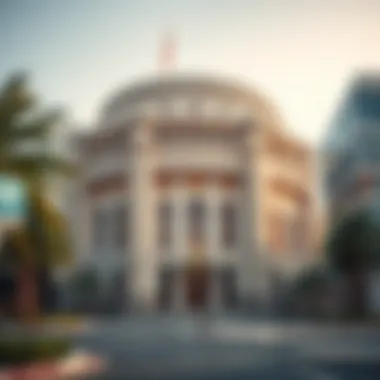

"An efficient public transport system not only connects people but fosters a community."
The overall confidence in public transport reflects in the choices people make. Increased reliance on public transport can also lead to environmental benefits, as fewer personal vehicles mean lower traffic congestion and reduced carbon footprints. This reliance can cultivate a culture of community and shared experience within the urban context.
Social Life and Leisure Activities
Understanding social life and leisure activities in Dubai is essential for grasping the full picture of living standards in this dynamic city. The social fabric of Dubai is woven from diverse threads, influenced by its multicultural population. This aspect not only enriches the lifestyle of residents but also forms a unique environment buzzing with opportunities for personal and social growth.
Social and leisure activities are not merely pastimes in Dubai; they are platforms for connection and cultural exchange. From art exhibitions to food festivals and outdoor pursuits, the range of options available fosters community engagement and enhances the overall quality of life. As potential investors or residents, being aware of these activities can present invaluable insights into the lifestyle one can expect while living in this vibrant city.
Cultural Activities and Events
Cultural activities and events in Dubai demonstrate the city’s commitment to showcasing its rich heritage while embracing global cultures. Events such as the Dubai Shopping Festival or the Dubai Food Festival attract millions and highlight the city’s cosmopolitan nature. This diversity in cultural experiences is further evident in local art galleries, performances, and exhibitions that frequently take place across the emirate.
Several organizations, such as the Dubai Culture and Arts Authority, play a pivotal role in enriching the cultural landscape. The Cultural Events Calendar lists numerous happenings throughout the year, providing residents and visitors with plenty of opportunities to immerse themselves in the local scene. Moreover, engaging in cultural activities can serve as a bridge to understanding local traditions and customs, thus knitting tighter social ties among different communities.
- Art: Local art scenes are burgeoning, with galleries in areas like Alserkal Avenue showcasing emerging artists.
- Festivals: Participate in world-class events like Art Dubai, where international artists exhibit, creating a melting pot of creativity.
- Workshops: Attend workshops for traditional crafts, offering not just education but a chance to mingle with like-minded individuals.
Recreational Spaces and Attractions
Dubai's recreational spaces and attractions are among the numerous elements that embellish the living experience in the emirate. The city boasts an impressive array of parks, beach resorts, and entertainment venues, all designed to cater to varied interests. These places provide not only relaxation but also an avenue for community interaction.
Some notable recreational areas include:
- Dubai Marina: Offers beautiful walks along the water's edge, alongside amenities for dining and leisure activities.
- Zabeel Park: Aims to provide a green oasis within the urban sprawl, featuring spaces for picnics, sports, and events.
- Dubai Mall: More than a shopping destination, this mall includes an ice rink, an aquarium, and entertainment options spanning all ages.
Active engagement in local recreational mechanisms can often help newcomers navigate previous adjustments to a rapidly changing environment.
In summary, the social life and leisure activities in Dubai paint a vivid portrait of what it means to live in this bustling city. The blend of cultural activities, events, and ample recreational spaces leads to a lifestyle where residents can forge meaningful relationships while enjoying a diverse set of experiences. All these factors play a crucial role in determining living standards and can directly or indirectly influence the decision-making process for potential investors, renters, and developers.
Challenges of Living in Dubai
Living in a city as thriving as Dubai offers myriad opportunities, but it’s not without its challenges. These hurdles can impact both everyday life and long-term planning for residents. Understanding the complexities behind these challenges is crucial not only for current inhabitants but also for prospective investors and expats. This part of the article digs into economic disparities, environmental concerns, and how newcomers can adapt to life in this bustling metropolis.
Economic Disparities
The contrast in wealth is significant in Dubai. On one side, you have skyscrapers, luxury hotels, and lavish lifestyles, while on the other, there’s a segment of society struggling to make ends meet. Many workers, particularly in service industries, face low wages compared to the exorbitant living costs. This gap can lead to social tensions and perceptions of inequality.
- Cost of Living: The high cost of living in areas like Downtown Dubai can be daunting. For instance, the price of a meal or a rental can vary drastically based on location. While downtown may symbolize luxury, the surrounding areas offer more affordable choices, though they come with trade-offs like longer commutes.
- Employment Opportunities: The job market can also be uneven. High-paying roles abound, but they often require specific skills. Conversely, many workers in lower-paying jobs may find limited avenues for upward mobility.
Under the surface of Dubai's glitz and glamor lies a deeper examination of how these economic disparities affect community cohesion and life satisfaction.
Environmental Concerns
Dubai’s rapid development has been a double-edged sword when it comes to the environment. Although the skyline is nothing short of spectacular, it has come at a cost. Issues such as water scarcity, air pollution, and waste management present genuine challenges. Residents need to consider the sustainability of their lifestyle in the face of environmental stressors.
- Water Usage: Freshwater in the UAE is scarce. The city heavily relies on desalination, but this process consumes enormous amounts of energy, raising costs and environmental impacts.
- Air Quality: The rise in construction has sometimes compromised air quality. Dust storms, common in the region, coupled with emissions from vehicles and industries, can affect residents' health.
- Waste Management: With a growing population, waste has become another pressing issue. The sheer volume of refuse generated leads to a critical need for effective recycling initiatives and waste-disposal systems.
Thus, addressing these environmental concerns is essential for ensuring a high quality of life for present and future generations.
Adaptation for New Residents
For those who have uprooted their lives to move to Dubai, the transition can be more than just finding a new job or home. It involves significant cultural and lifestyle adjustments. New residents often encounter both the excitement of living in a vibrant city and the challenges of adapting to its unique social landscape.
- Cultural Nuances: Understanding local customs and etiquette can sometimes feel like walking on eggshells. Festivals, religious practices, and social norms differ greatly from what newcomers might be accustomed to, making cultural sensitivity vital.
- Language Barrier: While English is widely spoken, Arabic is the official language. This sometimes creates communication challenges, particularly in legal or formal situations.
- Integration: Finding a social circle can also be tricky. Though there are many expat groups available, building deep connections takes time, as many find locals are often busy or less approachable.
In order to thrive in Dubai, new residents need to embrace these observations and actively cultivate a spirit of understanding and adaptation.
Future Outlook of Living Standards in Dubai
The future outlook of living standards in Dubai is a topic that commands attention for various reasons. As a city that continues to be a focal point for international business and tourism, Dubai is constantly evolving. Understanding what lies ahead is essential for investors, renters, and anyone considering relocation. Factors influencing these future standards include shifts in real estate trends, the balance of economic growth with social equity, and initiatives aimed at sustainability. By delving into these elements, we can better appreciate what life might look like in this dynamic city.
Predicted Trends in Real Estate
In the realm of real estate, several emerging trends are poised to reshape the landscape of Dubai living. First and foremost, we’re witnessing a growing demand for mixed-use developments, where residential, commercial, and recreational facilities blend seamlessly. This trend is gaining traction as city planners prioritize walkability and community-centric living.
Additionally, affordable housing options are likely to bloom as the government emphasizes inclusivity in its housing policies. Given the rising number of expatriates seeking homes, developers are responding to this necessity with innovative solutions that balance quality living while managing costs. The rental market in regions like Jumeirah Village Circle and Dubai Marina is expected to see fluctuations, as the influx of new residents impacts supply and demand.
Another notable trend is the embrace of smart homes. As technology becomes ever more integrated into daily life, properties equipped with advanced automation features and energy-efficient systems will attract a discerning clientele. According to the Dubai Real Estate Market Report, such innovations not only enhance comfort but also contribute to lower utility costs—a win-win for residents.
"The market is a reflection of the social fabric—adaptable, resilient, and ever-changing, much like the people who call it home."
Sustainability Initiatives
As Dubai charts its course for the future, sustainability initiatives will play a pivotal role in shaping the living standards. The government has committed to various projects aimed at reducing the city's carbon footprint and promoting green living. For instance, the Dubai Clean Energy Strategy 2050 sets an ambitious target for increasing the share of clean energy in the total energy mix.
One significant development is the launch of Dubai's first fully sustainable community, called The Sustainable City. This project exemplifies the commitment to integrating eco-friendly practices into urban planning, incorporating solar energy, water recycling systems, and vegetation that promotes biodiversity.
Furthermore, transportation initiatives are expected to evolve, making public transit more accessible and efficient. By investing in electric and hybrid buses, as well as enhancing cycling paths, the city aims to encourage greener commuting options among its residents.
The intersection of sustainability and lifestyle offers promising prospects for both current and future residents. With these initiatives in place, living in Dubai could become an increasingly attractive option for individuals who prioritize both comfort and environmental consciousness.


